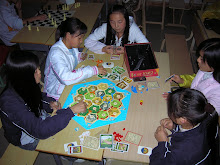During the final exam for phonetics over one hundred students filled two classrooms. A colleague monitored one class of fifty students and I monitored the other. The students generally complained that the exam was too difficult, but I explained that it is best if an exam’s roof is slightly out of reach. I’m not sure my point was well received, as the students continued to groan and sigh.
An hour into the test I caught two students helping one-another. I quietly took their tests and asked them to leave. Later a student was using an electronic dictionary under the desk and this student also had to go back to the dorms. Near the end of the exam, one student motioned for their neighbor to turn to a specific page in order to copy the answers (this was my interpretation from across the room).
The day before the phonetics exam, one student cheated on the listening final exam by using notes. The student was looking at me strangely during the test, so I decided to investigate. When I arrived at the listening station it looked as if their chair had a mattress tag: the student was sitting on a stack of cheat sheets and the front page was covered with the answers to questions on the listening final. At the student’s feet was a bag they had brought, which contained books and an extra pen. There was no way this student “accidentally” sat on the notes when they could have put them in the bag instead. And yet, the student protested that the notes weren’t being used.
The students during the phonetics final had similar excuses. I had felt so badly for them and then they began to give me excuses for their behavior. It was bad enough that they had cheated, but when they began to give excuses it made them seem to have no moral compunction. Couldn’t they just admit they had made a mistake? Maybe not.
I have realized that writing helps me and it also fills me with questions. As I write I begin to understand more about my feelings and the cultural responses in this country. The drawback is that I begin to encounter questions that I have no time to explore, and this case is a prime example. What time do I have to try and comprehend the difference in morality based upon cultural and historical teachings? Besides, I lack the cultural knowledge to answer this question fully. These experiences can only add to my growing body of knowledge about China.
I am almost certain the students didn’t understand how I felt, but most of them apologized anyway. After such efforts to try and explain away the cheating, the apologies seemed like last-ditch efforts to avoid punishment rather than sincere feelings. It would be easy to see my feelings about the cheating as something like anger or a sense of the students “letting me down.” But I did not feel these things. I was confused and upset, but mostly I was sad. I had not expected deliberate cheating. The entire incident has led me down the dangerous road of generalization, but knowing that students cheat in America too helps me to avoid this.
I want to address why I feel the students cheated (and why I think most people cheat). The students were taking an important exam. The benefit of cheating is clear: a higher score on the exam. The drawback is not quite so clear and, in some ways, more flexible: the possibility of getting caught. The reaction of the teacher (unknown to them when they cheated) must have been worth the risk of being caught. Simple, right?
Did the students factor in the damage the cheating would do to our relationship? The very idea of cheating, though considered morally wrong in most cultures, is more flexible in China. Perhaps it is easier for a Chinese teacher to forgive a student who has cheated than it will be for me. Of course, all will be forgiven in time, but I may never again be able to trust these students fully. And worse, their cheating makes me suspect that there were more students who simply did not get caught. If I caught half of the students who were actually cheating (making me an expert catcher) then that means that 20% of the students were cheating.
Please note that these are only ruminations, not conclusions. This is yet another experience that has shown me just when I think I understand something about China or Chinese culture, I am given an entirely new problem to contemplate. This problem would be difficult enough in America, but adding language and cultural barriers makes it even more puzzling. On the positive side, perhaps some students will be affected by this event and decide to never cheat again. How I deal with the problem in the next few days will likely determine what they will do in the future. Should I simply give them all zeroes? Offer them another test for possible full credit? Something between these extremes?
Maybe the school needs to formulate and teach an honor code to help the students govern their own morality. Or maybe (and I doubt it, but one never knows) cheating is an important part of being successful in Chinese society: maybe those who are cheated are the fools and the cheaters are the heroes. It’s like our president once said: “Fool me once, shame on – shame on you. Fool me twice…you can’t get fooled again.”
12.28.2007
Subscribe to:
Post Comments (Atom)








2 comments:
I am tough on cheating too. I recently had a (Korean) student cheat on a test. I gave him a zero and the kid he cheated from. They are only 5th graders, but I wanted them to understand I had zero-tolerance for that. I do think that the Asian culture puts a lot of pressure on their offspring to be "the best". Cheating seems to be a way of creating the image of being smarter. Unfortunately, it does compromise their character. Sadly. I am glad you are troubled by this. Some of us need to be.
Hope you had a Merry Christmas. Bet it was a weird one. I remember being in Hawaii at Christmastime. That was weird enough.
Best of New Years, Dustin.
Jean
Gostei muito desse post e seu blog é muito interessante, vou passar por aqui sempre =) Depois dá uma passada lá no meu site, que é sobre o CresceNet, espero que goste. O endereço dele é http://www.provedorcrescenet.com . Um abraço.
Post a Comment